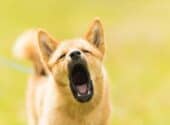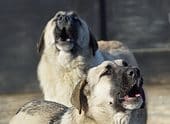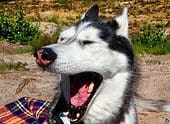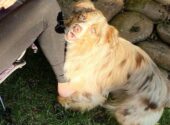So your dog is constantly licking the floor. And you aren’t sure why.
Maybe they’ve got an upset tummy and are trying to soothe it. Or perhaps they are bored, and licking the floor is their only outlet.
Whatever the reason, you’d like to know what to do. And that’s where we step in! In this article, we’ll help you figure out what’s wrong with your furry friend, so be sure to read on.
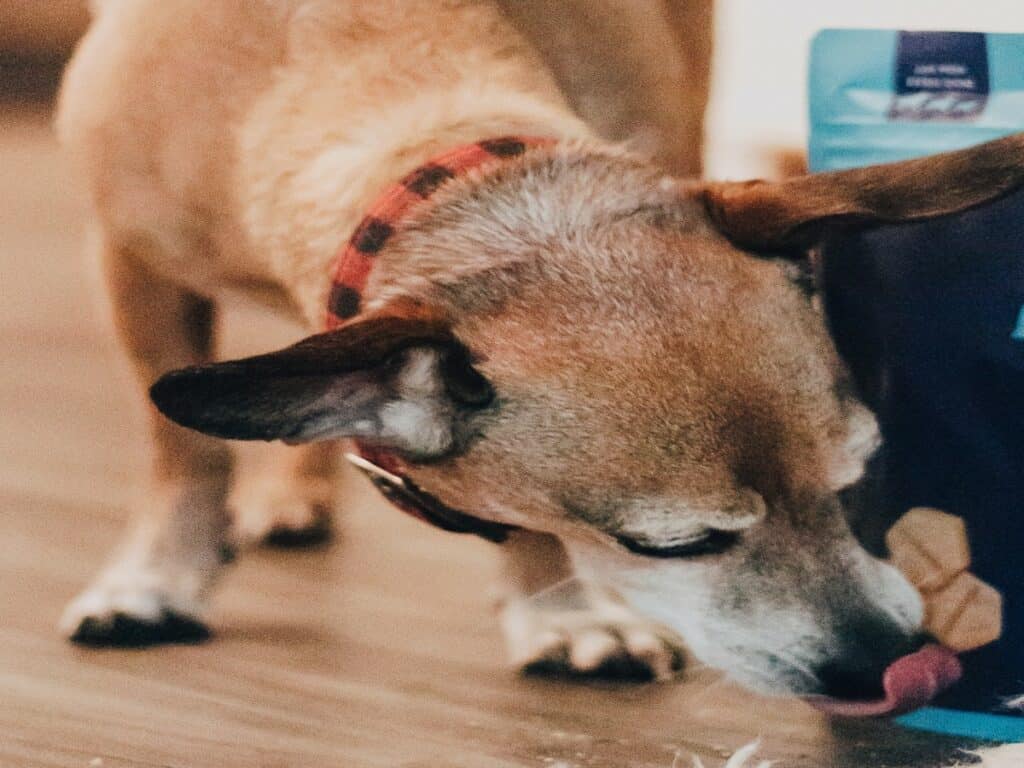
Is a Dog Licking the Floor Normal?
If you’ve ever had one of those moments where you’re unsure why your dog is licking the floor, you’re not alone. So many people ask themselves the same thing: why does my dog lick the floor constantly?
Dogs use their mouths and tongues to test things they find. They’ll probably lick that spot until the good flavor disappears if they find something tasty. They use this normal behaviour to explore their surroundings and figure out what’s good for them.
For example, if you spill something on the floor, your pet may lick it for only a few seconds before they get bored of it, just until the taste is gone.
But here’s the rub: If your dog continues to lick the floor even though there’s no longer any trace of the taste of whatever was on there before, then they’re most likely not trying to get the taste of something off the floor.
There’s a big distinction between a dog that licked a spot a few times versus one who excessively did so for long periods. If the behavior became repetitive and excessive, that would be considered a health issue called ELS, or Excessive Licking Syndrome in dogs. This refers to excessively licking objects and surfaces and may be caused by several factors.
Why is my Dog Constantly Licking the Floor? 8 Reasons for This Behavior
How often have you asked yourself this question: Why does my dog lick the floor? We bet you did more than you can count!
There could be a few reasons your dog is constantly licking the floor, and it’s crucial to figure out which one is causing the problem so you can solve it.
Reason 1: Upset Stomach
An upset stomach is one of the reasons why dogs lick the floor, and it’s not always easy to diagnose. As a matter of fact, one study found that 773 percent of dogs suffering from ELS have gastrointestinal issues ranging from irritable bowel syndrome and Giardiasis to pancreatitis.
The researchers argue that ELS is a behavioral response to having an upset stomach. Dogs’ constant licking motions may increase salivary flow, buffering against the acid in their digestive system. Or perhaps the saliva provides extra lubrication, making it easier for them to vomit.
In other words, your dog could be experiencing something called an upset stomach, and licking is a way of relieving that upset.
There are a few things you can do to help your dog get relief:
- Feed your dog smaller meals throughout the day rather than one large meal. This will prevent his stomach from becoming overly full and cause him to overeat.
- Give your dog plenty of water. They may be thirsty from licking the floor.
- Feed your dog high-quality food that contains enzymes or acids that can help soothe an upset stomach.
- If none of these suggestions works, you might need to take your dog for an examination by a veterinarian. There could be some problem with their digestive system that needs to be addressed.
Reason 2: Stress
Stress affects almost everyone — even pets! Dogs are social creatures, and when they feel stressed, they may seek out human companionship in various forms, including excessive licks and chews, destructive behavior, etc.
If your pet keeps licking the floor, it may be time to look at your life and see if there’s anything you could change to make things easier for both of you. For instance, you can take a break from work or spend more time with your dog – to help them feel more comfortable.
If you want to help your stressed-out pet, you’ll need to figure out which stressor makes them anxious. It might be something external, like noise from a nearby road project, or it could be due to a change in their daily routine.
Other times, the cause may be less obvious, like an underlying medical condition.
That being said, the cause could simply be stress caused by lack of exercise. Your pet may need some extra time outside. And, if you can, get your dog involved in some interactive play, like chasing a ball, playing catch, or going for a walk.
Reason 3: Cushing’s Disease
Higher than normal amounts of Cortisol can lead to a diagnosis of Cushing’s syndrome. The hallmark symptoms of this condition include increased hair loss, low energy, excessive panting, appetite, urination, thirst, and frequent acne. If left untreated, Cushing’s disease can cause a variety of serious medical conditions, including heart trouble, diabetes, and a decrease in bone density.
So how is Cushing’s disease treated in dogs?
There is no one-size-fits-all answer to this question, as the treatment plan for Cushing’s disease will vary depending on the severity of the condition and the age and general health of the dog. However, dogs’ common treatments for Cushing’s Disease involve lifestyle adjustments, medications, and surgery.
A lifestyle change includes decreasing the amount of exercise the pet gets and feeding a balanced diet.
Medication can include corticosteroids, which are medications that imitate the effects of natural hormones in the human system.
Surgery can include a variety of procedures, including surgeries to remove excess fat, surgeries to reduce the production of Cortisol, or surgeries to remove cancerous cells that are producing too much Cortisol.
Discussing your dog’s health issues with your vet is essential because Cushing’s syndrome can be a severe condition requiring a tailored treatment plan.
Reason 4: Boredom
Some dogs lick the floor excessively just because they’re bored. Licking is one common way for them to relieve boredom. This type of dog behavior can be troublesome but can also be fixed.
To start, try to provide them with plenty of exciting and stimulating activities to keep them occupied. Toys and treats can also be a great way to keep them engaged.
If your dog is getting restless and bored often, it may be a sign that they’re feeling lonely. If this is the case, consider getting them a dog friend. Dog friends can be a great way to get your dog out and active and to provide them with some extra companionship.
If their boredom becomes overwhelming, consider consulting a veterinarian about medication that can help ease their symptoms. In the meantime, be a good dog parent and provide them with the activities and company they need to have a happy and healthy life.
Read also: Why Does My Dog Growl At Nothing?
Reason 5: Canis Compulsive Disorder
OCD isn’t exclusive to humans; your dog can also suffer from OCD, and it may be the reason for their ELS. It’s also called CCD or Canis Compulsive Disorder in dogs.
Dogs who suffer from obsessive-compulsive disorders (OCD) share similarities with humans who suffer from the same condition, suggesting that OCD may be similar for both species.
Excessive licking, which becomes a compulsion for dogs showing ELS, can be considered an example of OCD. In addition, researchers have found that some dogs may be genetically predisposed to developing OCD. Some breeds more likely to develop OCD include Great Danes, German Shepherd Dogs, Jack Russell Terriers, and Doberman Pinschers.
Even in dogs prone to developing OCD, there’s a process to develop full-blown OCD. Usually, it begins with a stressful or frustrating event for your dog. Then, they start a certain behaviour, licking the floor, which becomes a way to relieve stress.
The pattern repeats. Soon, your dog is licking all the time to continue releasing those neurotransmitters so they can feel continued relief. The new behavior takes over, and your dog is now performing it excessively.
The good news is that there are ways of treating OCD in pets. Unfortunately, most people do not know about these treatment options because they believe that OCD is an inherent personality trait that cannot be cured. However, that is not the situation. There exist therapies that can help your pet get rid of their symptoms.
If you want to learn more about treating OCD in dogs, you should speak to your vet. They can tell you which treatments might be best for your dog and provide the support you need to help your dog get through the process.
Reason 6: Giardiasis
This condition in dogs is caused by a parasitic organism that affects the intestines. It can cause weight gain, lethargic behaviour, nausea, and diarrhea. Giardia parasites usually live in dogs’ intestines. However, they may also be present in other parts of the dog’s system.
Licking oneself, the floor, or something else doesn’t necessarily mean that your pet has Giardiasis. However, if your pet constantly licks while they’re outside, the chances of them picking up the parasite may be greater than usual.
Make an appointment with your veterinarian to check if your pet has this condition.
Reason 7: Pancreatitis
Pancreatitis is a serious condition that affects your dog’s pancreas – an organ that helps them digest food. Digestive enzymes produced by the pancreas help with digesting food. However, if these enzymes get too close to the stomach, they may break down other parts of the body, including the liver and kidneys. This can lead to serious health issues for dogs.
Pancreatitis in dogs can, if not treated properly, lead to death. Too much fatty tissue or calcium in the bloodstream is the most common cause, but obesity and licking toxic substances (like rancid foods) can contribute to pancreatitis in dogs. Symptoms may vary from dog to dog but usually involve difficulty breathing, loss of appetite/interest in eating, fatigue, vomiting, and sometimes diarrhea.
If you notice any of these symptoms in your dog, it’s crucial to take him to the vet as soon as possible. Treatment for pancreatitis in dogs typically involves antibiotics and pain relief medication.
Reason 8: Pica Syndrome
If none of the reasons explained above seems to apply to your dog, it may be possible that your dog has Pica syndrome. Besides excessive licking, dogs with Pica might eat things they’re not supposed to eat. These could be feces (coprophagia), rocks, or anything else.
The causes of Pica are not well understood, but some people believe that it may be caused by an underlying medical problem, including diabetes, malabsorption, and intestinal parasites. Psychological factors, such as stress, boredom or loneliness, could also play a role.
While pica syndrome can be a nuisance for some dog owners, it can be fatal in some instances and requires prompt and appropriate care. Here are three ways to treat Pica syndrome in dogs:
Make sure your pet has access to plenty of fresh water and nutritious foods. If your pet has Pica syndrome, it may lack certain essential vitamins and minerals.
- Restrict your dog’s access to dangerous substances. If your dog is eating things that could be dangerous, like rocks, make sure they can’t get to those substances easily. Put them in a locked cabinet or room, for example.
- Contact a vet immediately if these remedies don’t help or if your dog shows signs of severe illness, like seizure episodes.
Are There Any Potential Dangers Associated with my Dog Licking the Floor?
After you’ve determined why your dog licks the floor, this doesn’t necessarily mean that your pet will stop doing so immediately. This particularly holds true if your pet is licking the floor out of obsessive or compulsive behavior.
If you cannot keep your floors clean, or if you’ve got kids at home who leave their toys everywhere, your puppy might be eating something dangerous or poisonous for them. These include chips, chocolate biscuits, grapes, and gum containing the sweetener xylitol.
Xylitol can be poisonous to dogs if they consume enough of it. It also forms a hard substance called plaque on the teeth, leading to tooth decay and even tooth loss.
Moreover, a study about Xylitol published in the Pacific Journal of Energy Medicine adds that Xylitol can cause a sudden drop in blood pressure, leading to convulsions.
If a smaller dog eats something that’s hard and brittle, such as a small piece of glass or a small toy part, it may get stuck in its digestive tract and need emergency surgery to remove it. If this occurs, your pet will not be able to consume anything and will show signs of distress.
Another potential problem with this behavior is the number of fibers your dog ingests if they continuously lick the floor or carpet. If you have an American Bulldog or other large breeds, you may not need to worry about your pet forming a “hairball” of floor or carpet fibers in their stomach that they cannot digest.
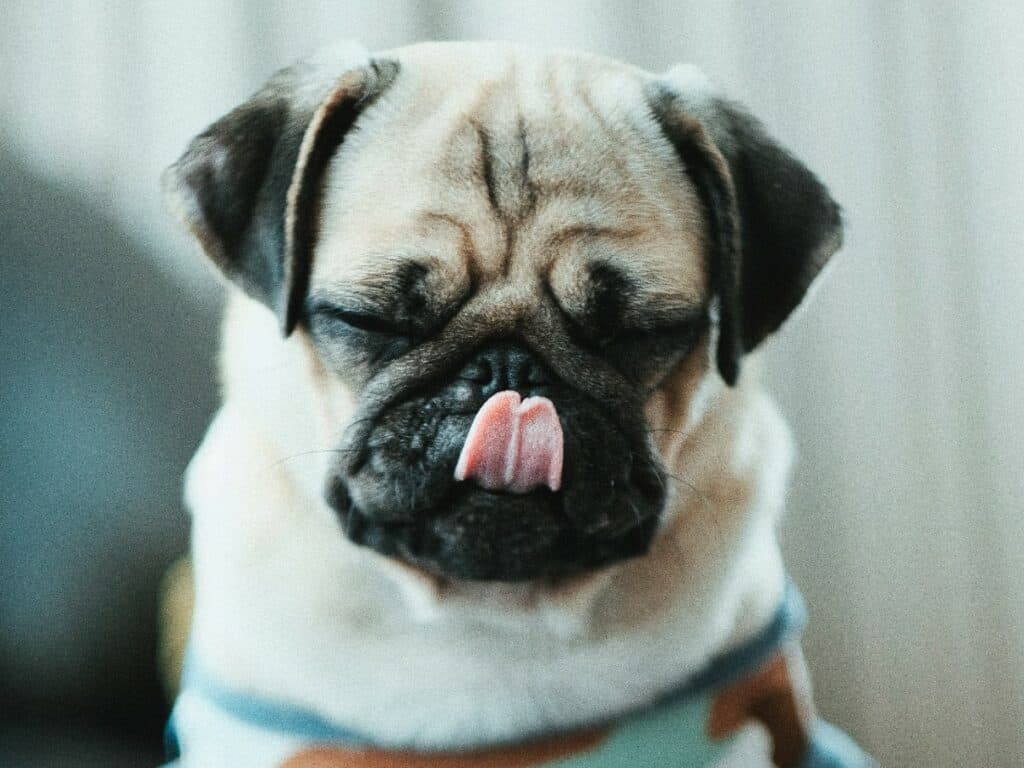
However, if you have a smaller dog, like a Pug or Shih Tzu, there’s always the chance that they might get some carpet or fiber stuck between their teeth and gums. This could cause them to develop gum infections and eventually lose their teeth.
How Do I Stop my Dog from Licking the Floor?
It may be challenging for you to stop your dog from licking the floor if they have an Obsessive-Compulsive Disorder (OCD). However, you can try using puzzle pieces or toys to distract them from their compulsion.
If the licking is due to stress and boredom, you can give your dog regular exercise and positive reinforcement.
But if your pup’s constant licking is caused by a medical/neurological condition (upset stomach, Cushing’s Disease, Giardiasis, Pancreatitis, and Pica Syndrome), your vet is best equipped to help.
Why Does My Dog Lick the Floor? Our Conclusion
In summary, if you observe your dog licking the floor frequently or abruptly, it could indicate Excessive Licking Syndrome (ELS). This condition can be caused by various factors, including stress, Cushing’s disease, Canine Compulsive Disorder, Giardiasis, Pancreatitis, or Pica syndrome.
To determine whether your dog suffers from ELS, talk to your veterinarian to rule out any underlying health issues and see if there are any behavioral solutions that can help ease your pooch’s anxiety.
Related Questions
Why do dogs lick the floor when sick?
The most common reason is that they’re trying to get rid of the disease or bacteria that’s making them sick. They may also be licking the floor to soothe themselves.
Why does my dog lick the floor after eating?
Some theories about why dogs lick the floor after eating include trying to clean up after themselves, stimulating their salivary glands, or satisfying their hunger pangs.
Why does my dog lick the floor at night?
Your dog may lick the floor as a way of communicating with you. If you’re not sure what your dog is trying to say, you can try asking them directly. For example, if your dog starts licking the floor when you’re getting ready for bed, you might say something like, “Hey, stop licking the floor. It’s time for bed.”
Why does my dog lick the floor after drinking water?
If your pet is licking the floor after drinking some tap or purified, it could be a symptom of an issue with the tap or the quality of the tap itself. Try changing the tap if necessary.
References
Duarte, A. (2008). Xylitol: Sweet and healthy. Pac. J. Energy Med, 2, 58-64.
Tynes, V. V. (2008). Help! my dog licks everything: although many owners think it is simply annoying, excessive licking can harm a dog or be a sign of medical problems. learn to identify the causes of repetitive licking in dogs and how to treat it, so you are ready the next time owners bring up the issue. Veterinary medicine, 103(4), 198-209.
Bécuwe-Bonnet, V., Bélanger, M. C., Frank, D., Parent, J., & Hélie, P. (2012). Gastrointestinal disorders in dogs with excessive licking of surfaces. Journal of Veterinary Behavior, 7(4), 194-204.
Castillo, V. A., Gomez, N. V., Lalia, J. C., Blatter, M. C., & Garcia, J. D. (2008). Cushing’s disease in dogs: cabergoline treatment. Research in Veterinary Science, 85(1), 26-34.
Palestrini, C., Mazzola, S., & Cannas, S. (2019). Compulsive disorders in dogs and cats. Veterinaria (Cremona), 33(4), 201-209.

